Are Small Farms Profitable? (Yes, but...)
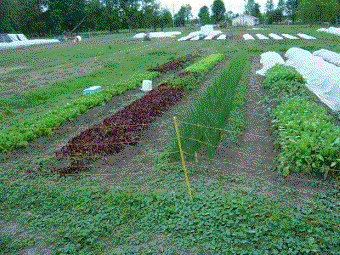 Looks great but does it make money? Looks great but does it make money?If you are thinking about a small farm business of your own, no doubt one of your first questions will be ‘are small farms profitable’? Small farms absolutely contribute to feeding communities and sustainable agriculture, and I personally believe they (we) are the future of food. But the question remains, can small farm businesses reliably turn a profit? The short answer is ‘yes’, of course small farms are profitable. The slightly longer answer is ‘yes, provided you have put real thought and effort into your model of operations’. But the good news is, there is more than one path to small farm profitability. In this article I’m going to look at half a dozen profitable small farms, and examine some of the reasons for their success. They took different approaches but all found a way to make the small farm game pay. Here’s the list:
Let’s start with the Prince of Pastures, Joel Salatin. Joel Salatin, Polyface Farm
 Pastured poultry is the 'mother ship enter prose' at Polyface Farm in Swope Virginia Pastured poultry is the 'mother ship enter prose' at Polyface Farm in Swope VirginiaJoel Salatin of Polyface Farm may be the best-known advocate for pasture-based farming in North America. I own several of his books, including Salad Bar Beef, Pastured Poultry Profit$, and You Can Farm, every one of which I heartily recommend to the new or soon-to-be farmer. Needless to say, these books contain a wealth of practical advice about profitability on a small farm; here’s one of the key pieces. Diversify, but do it intelligently. Joel and his extended family have created multiple farm enterprises. But their key to success has been to master one before adding others. Joel has used the term ‘mother ship’ to describe the core enterprise that is the defining feature of the farm. In an interview Joel said ‘At Polyface, our mother ship is the pastured broiler. Even though we raise many other animals, when we think about our distinctive — our claim to fame, if you will — it always revolves around the pastured broiler’. Perfecting their system for pastured broilers generated profits that let them expand into other livestock, and a whole host of diverse and complementary enterprises. To summarize Joel’s advice, diversify, but don’t spread yourself so thin you ‘endanger the mother ship’. Eliot Coleman, Four Season Farm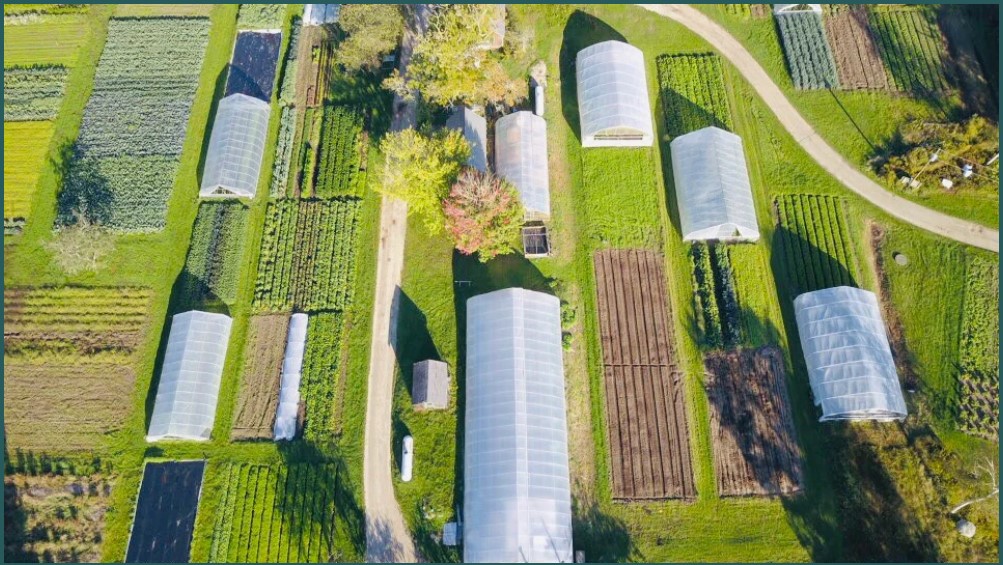 Eliot Coleman's answer to the question 'are small farms profitable' involves optimum use of season extension at his farm in Harborside, Maine. Eliot Coleman's answer to the question 'are small farms profitable' involves optimum use of season extension at his farm in Harborside, Maine.If Joel Salatin is the Prince of Pastures, then Eliot Coleman is the High Priest of Season Extension. Eliot is the author of ‘The New Organic Grower’, ‘The Winter Harvest Handbook’, and ‘Four Season Harvest’. And yes, I own them all (you should too). Eliot and his wife Barabra Damrosch (author of ‘Theme Gardens’ and ‘The Garden Primer’) have profitably operated Four Season Farm in Maine for several decades. He coined the term’ farming the back side of the calendar’, which exemplifies his approach to commercial production of fresh vegetables in unheated greenhouses in cold-winter climates. One of the goals of a small farm is to produce year-round income, and Eliot’s approach fulfills that mission admirably. With the right crop selection, intensive growing techniques and the right tools (some of which Eliot invented – see the collinear hoe), extending the season can also extend your profits. Eliot’s books provide a wealth of information on doing just that. Michael Ableman, Sole Food Street Farms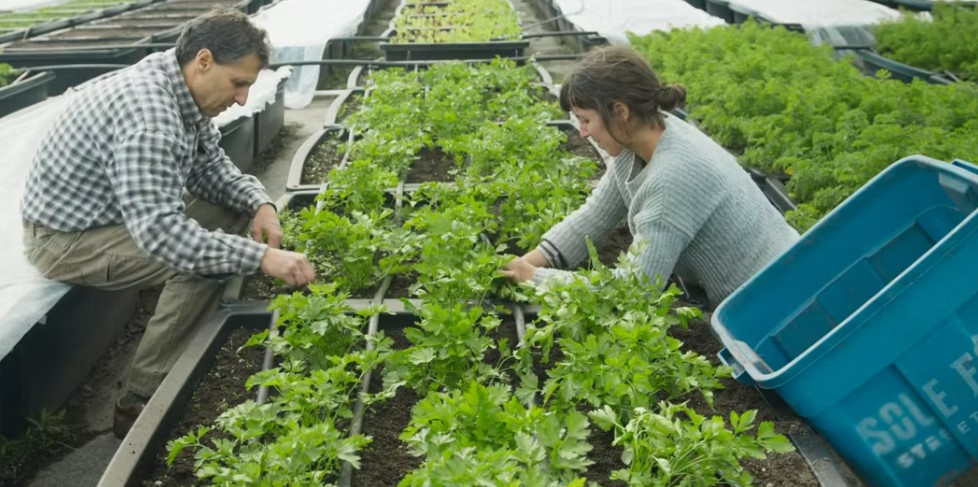 An amazing farm built on pavement in Vancouver B.C. Canada An amazing farm built on pavement in Vancouver B.C. CanadaMichael Ableman is the founder of Sole Food Street Farms in Vancouver, Canada and author of several books including ‘Farm The City: A Toolkit for Setting Up a Successful Urban Farm’ (it’s in my library of course). Michael has adequately demonstrated that small farms can be profitable. His book doesn’t shy away from the problems and challenges with urban farming and presents a lot of very practical real world advice on transforming urban and suburban spaces into productive farmland. Michael places a lot of emphasis on the importance of farm planning. ‘The successful urban farmer will develop an overall plan that plots out the stages of a crop’s development from seed to sale, including planting information, harvest details, and sales’. This good advice doesn’t just apply to urban farms, I’ve written a couple articles about data-driven decision making and the importance of record-keeping. Michael has embodied this to an awesome degree. Richard Wiswall, Cate Farm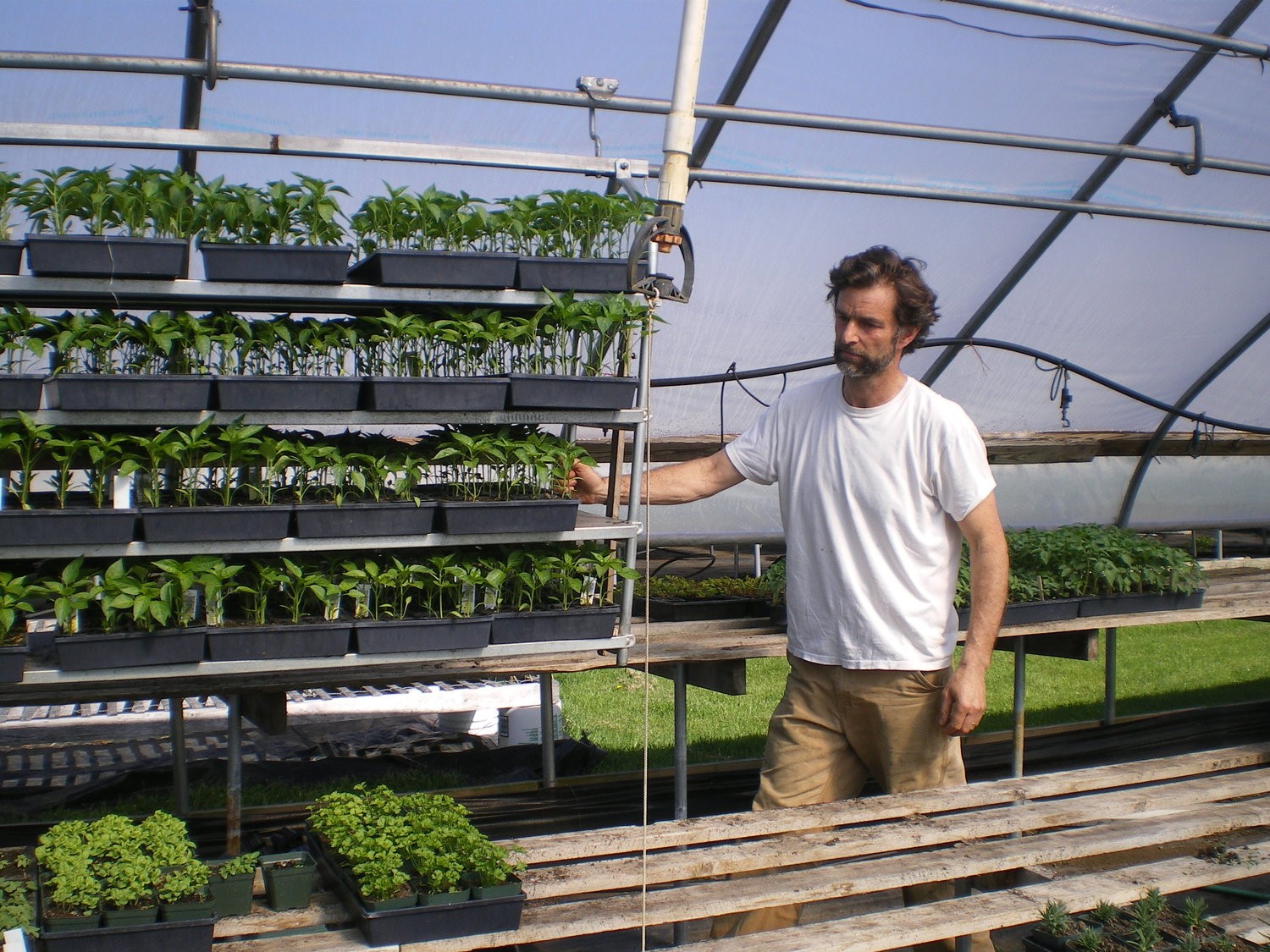 Ready for spring at Cate Farm, East Montpelier, Vermont Ready for spring at Cate Farm, East Montpelier, VermontRichard is the owner of Cate Farm and the author of ‘The Organic Farmer’s Business Handbook: A Complete Guide to Managing Finances, Crops, and Staff- and Making a Profit’. I’ve got the soft copy of this one from Amazon, the hard copy book doesn’t ship to Canada. As you might guess from the book title, Richard’s emphasis is on understanding that a successful, profitable farm is a business. In his view, ‘profit’ is something you plan for; business planning and financial management are critical to small farm success. His book is full of good examples of how to do just that. Absolutely worth the price. Shannon Hayes, Sap Bush Hollow Farm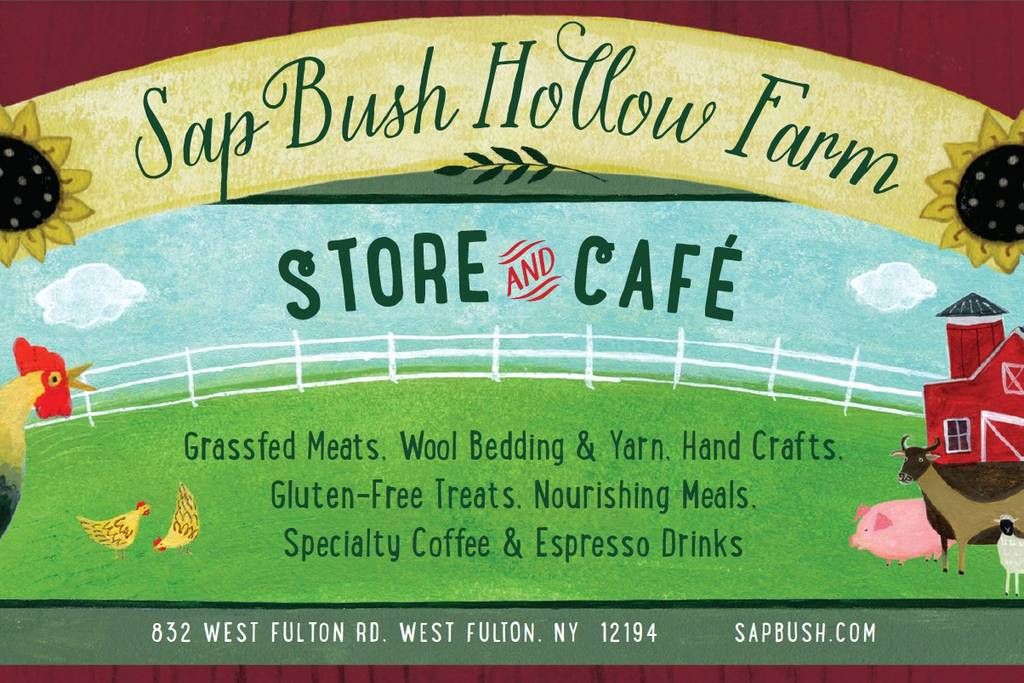 Shannon and family operate multiple enterprises in West Fulton New York Shannon and family operate multiple enterprises in West Fulton New YorkShannon of Sap Bush Hollow Farm is a farmer, multiple business owner, and author of ‘Radical Homemaker’s and ‘Redefining Rich’. In the latter book she makes the case that ‘quality’ is more important than ‘quantity’ when it comes to designing your life. No mistake, profitability is important, but you can’t lose sight of your Vision while pursuing a livelihood. Her Vision is encapsulated in a Quality of Life statement, which not only describes her priorities – family and community and contribution – but also what she is willing to give up or put up with to pursue that Vision. I’ve written before about the power of Vision to determine your priorities and motivate your actions. Shannon does a great job of explaining the importance of that in your own business. Jean-Martin Fortier, Les Jardins de la Grelinette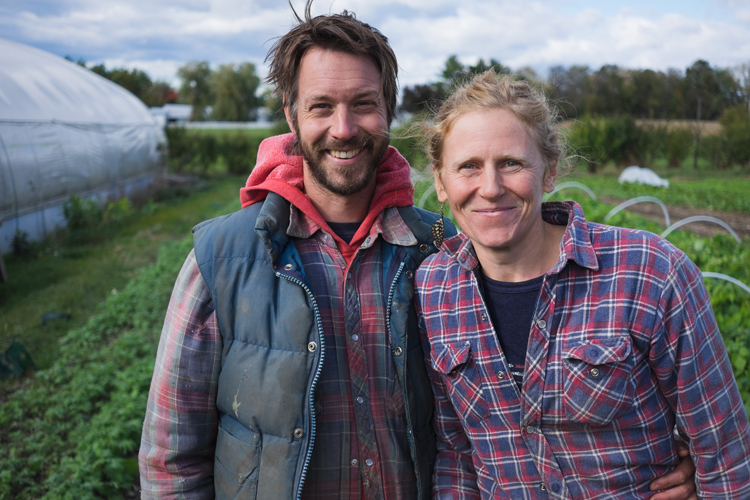 Jean-Martin and Maude-Hélène Desroches at their market garden at St-Armand au sud in Quebec. Jean-Martin and Maude-Hélène Desroches at their market garden at St-Armand au sud in Quebec.Jean-Martin Fortier, Les Jardins de la Grelinette, is the author of 'The Market Gardener' (I got it). Jean-Martin and his partner Maude-Hélène Desroches have managed the impressive feat of generating a 6-figure income in an organic market garden approximately 1.5 acres in size. They use low-tech but high-efficiency methods including effective use of crop rotations, permanent raised beds, season extension and intensive planting. But I think the key message is Jean-Martin and Maude-Hélène have created systems that work for them, combining these techniques intelligently to reduce labour and increase profitability. For example stale bed planting using tarps to pre-sprout and kill weeds allows intensive planting because the need for weeding is reduced. The permanent raised beds means primary tillage is eliminated, and water and nutrients can be concentrated They manage this highly efficient garden with hand tools e.g. the broadfork, reducing machinery expenses. Jean-Martin's book is highly recommended to any grower interested in 'human-scale' agriculture. It's a definitive answer to the question 'are small farms profitable'. Are small farms profitable? The New Terra Farm Answer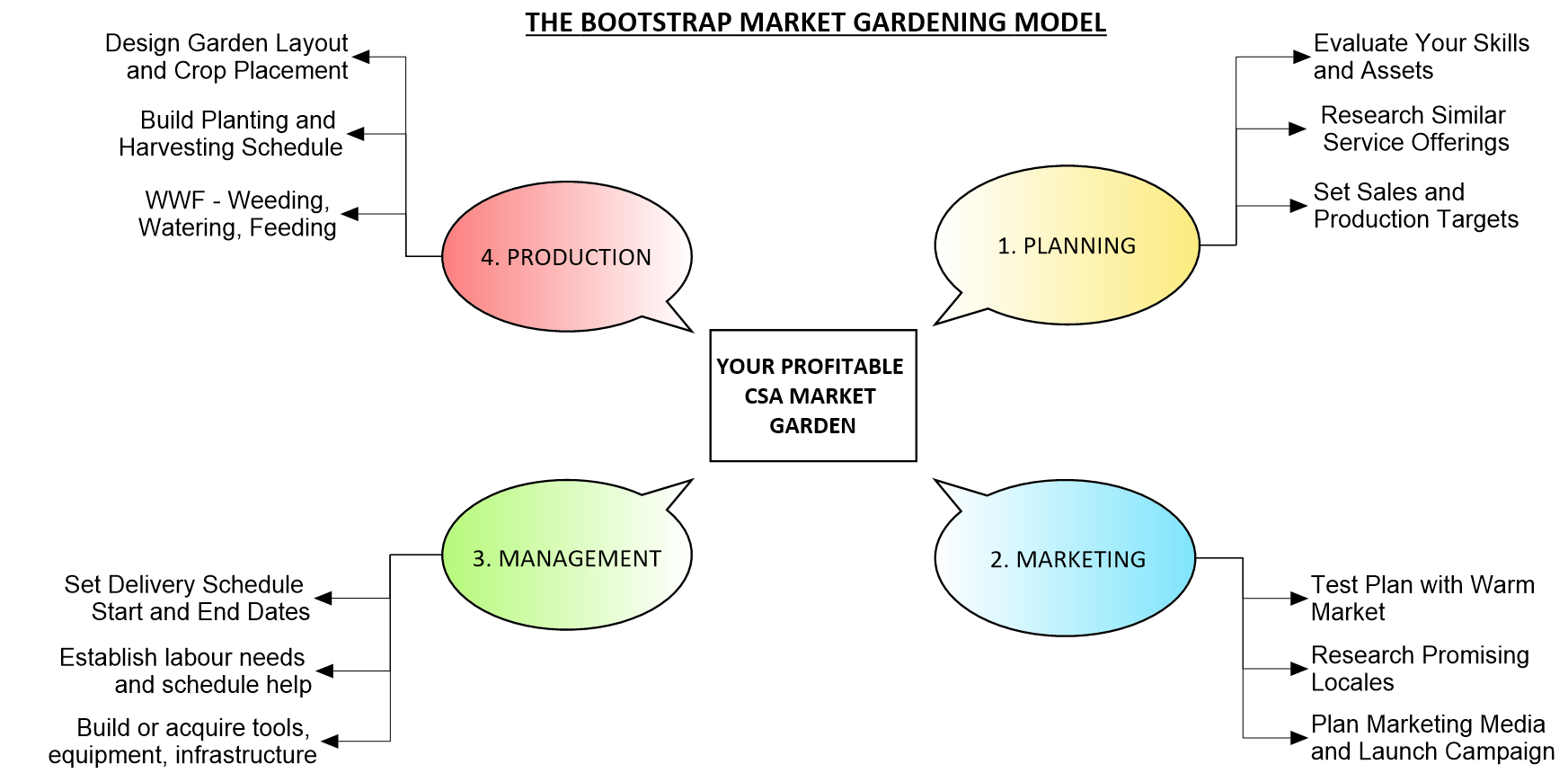 This is the profitable model we developed for New Terra Farm This is the profitable model we developed for New Terra FarmSo to summarize: the answer to the question 'are small farms profitable' is emphatically YES... if you diversify intelligently, make maximum use of season extension, employ detailed farm planning and business planning, keep site of your Vision to stay on-track, and create integrated systems to reduce work and increase profitability. Honestly, I would hesitate to compare myself as a farmer or
an author to the amazing people described in this article. But my own
contribution to making small farms profitable is my Planning, Marketing, Management, and Production model, first developed way back in 2005. I know it has helped a number of growers build their own profitable small farm businesses. We achieved our success through our own ‘mother ship’, our CSA Market Garden. The garden came first, then we added pastured poultry, pork and value-added products to our offering, most of which was bought by our CSA customer base. And we have a couple unheated hoop houses for season extension, and I actually teach a course about business planning and operational planning for small farms. So I’m following in the footsteps of these awesome growers. You could probably benefit from doing the same. You can get my CSA model here in my Bootstrap Market Gardening book, or get the whole New Terra Farm story (market garden, greenhouses, raising pastured pigs and poultry) in my complete Start Farming Pack. Other Links of Interest
Here's a great resource for to find the ABSOLUTE BOTTOM LINE for the cheapest food supply. Efficiency is Everything This is a pretty good article about Urban Survival. You might also want to up your survival game with my Homestead Book Bundle And, because there is more to survival than just food, here's a resource with literally HUNDREDS of great tips and low-cost projects for your homestead. The Self Sufficient Backyard. Highly recommended.
|
See Something You Like? Share!
Got questions to ask, stories to tell?
Share your organic market gardening question, or comment, or story.
Other Visitors Questions and Comments
Click below to see contributions from other visitors to this page...
SouthEastern United States-Small farm 




Hello,
I own roughly 9 acres of land in the Southeastern United States. Out of the 9 acres, roughly 3 of it are located near a creek and are more damp …
I'm an affiliate for some products I promote on this site. This means I get a small commission for a product you buy through a link on one of my pages. This doesn't cost the buyer anything, but provides me an additional income to help support these pages.